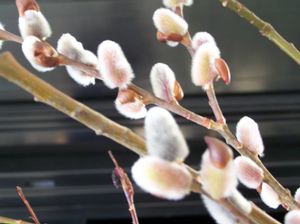Printed at http://www.quackingrassnursery.com/index.cfm/
Salix x 'Winter Glory'
Japanese Pussy Willow
Plant Type:
DECIDUOUS SHRUBSSalix x 'Winter Glory' – This is one of the most beautiful willows in cultivation. According to Michael Dodge, the guru of willows, "This beautiful and vigorous male hybrid was found in the wild in Japan and is a cross between two native species S. gracilistyla and S. caprea, which they call S. bakko! (There is reference to S. x leucopithecia as a cross between these species--horrible name for such a beautiful plant!)." Eek! Leucopithecia sounds like a disease. Anywho... It has huge silvery gray catkins that emerge from attractive glossy red bud sheaths against olive to olive brown wood. They begin to emerge in USDA zone 5b as early as late January, lasting for nearly 2 months. In some winters some sheaths will begin to crack and expose catkins at the New Year. The catkin size is the reason for another common name, Giant Pussy Willow; on maturing specimens in excellent conditions the catkins can be quite large. A quick growing shrub, this will make a fascinating screen or specimen with a long season of interest when little else has even begun to stir from the long winter nap! Established pot grown shrub from cutting.
From Carole B. (MI) on 5.5.2018 - The two salix I purchased from you arrived and are looking lovely. Thank you so much for such nice plants and
for the excellent packaging and shipping! I really appreciate it.Please scroll down to the Genus Overview for more information.
| Item | Description | Price |
|---|
Characteristics and Attributes for Salix x 'Winter Glory'
Season of Interest (Flowering)
- Winter / Spring
Season of Interest (Foliage)
- Spring / Summer / Autumn
Interesting Bark
- Smooth
- Colored
Autumn Interest
- Showy Buds
Light
- Full Sun
Attributes
- Hedgerow
- Massing
- Specimen
- Screen
- Marginal
- Shrub Border
- Hedge
- Basketry
Growth Rate in the Garden
- Rapid
Soil
- Fertile
- Moist
Origins
- Japan
Propagated By
- Cutting Grown
Genus Overview: Salix
Common Name: Willow
Salix. These are the willows, a large genus of woody plants. Some willows are small shrubs, others grow into huge trees and there are many bushy species which fall in between. All prefer sun planted in fertile moisture retaining soils; some are tolerant of quite wet feet. Many have quite attractive lanceolate leaves with silvery undersides that flash in summer breezes… I have often thought of these as the “poor man’s bamboo”. Some have contorted and beautifully colored bark which shines in the winter landscape. Many sport beautiful winter/spring catkins. Nearly all willows have utilitarian applications in fencing, rods, basket making. All are very prune-able; in fact, any of the larger shrubs depending upon how you desire to employ them will respond well to pruning and coppicing. When coppiced those with beautifully colored winter stems display many more of them. And as with ornamental shrub dogwoods younger stems exhibit the best, most intense winter tones. All ornamental characteristics will be presented according to species/cultivar. All of the following offerings are established pot grown shrubs from a cutting. We may prune back all larger growing selections prior to shipping so that you will not incur the extra handling charge.



